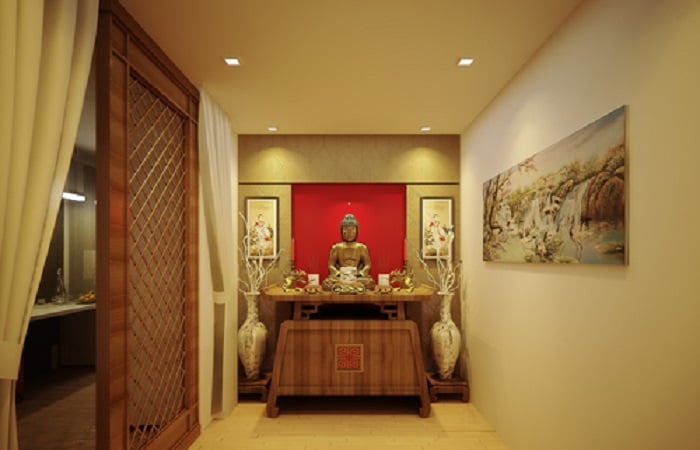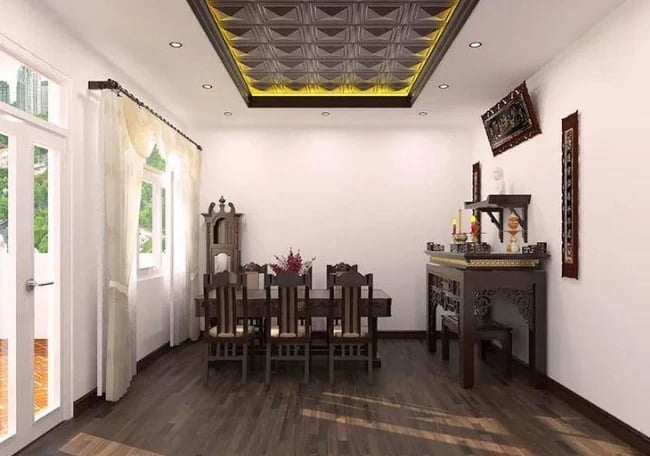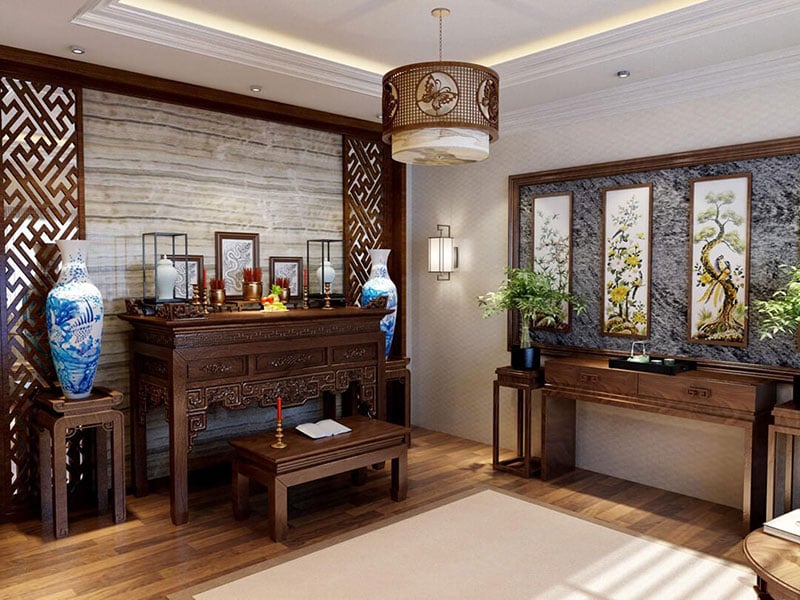Avoid Placing the Ancestral Tablet Right Against the Wall
Ancestral tablets, also known as long positions, are used to record the names of the deceased, similar to photos on an ancestor’s altar. According to feng shui beliefs, placing these tablets right against a wall is inadvisable.
If the head of the household positions the tablet this way, the family may encounter bad luck in their endeavors. Additionally, the health of family members, especially children, could be affected, leading to frequent illnesses and hindered development. To remedy this situation, simply create a small gap between the tablet and the wall.

Placing ancestral tablets against the wall is considered inauspicious in feng shui.
Inappropriate Alignment of the Altar with the House’s Direction
In feng shui, it is highly discouraged for the altar to face the opposite direction of the house. This situation can lead to disharmony within the family and, in more severe cases, even result in a lack of offspring. To address this issue, consider adjusting the altar’s orientation or using curtains and screens to maintain a harmonious worship space.
Positioning the Altar Directly Opposite the Main Entrance
When the altar is placed in line with the entrance, the energy flow from the pathway can directly enter the worship area. This arrangement is considered a major taboo in the eight-house feng shui system, negatively impacting the sanctity and divinity of the space.
Furthermore, wind from the main door can cause the incense burner and other offerings to shake. This not only diminishes positive energy but also invites negative influences. To counter this, the household can use natural bamboo curtains or screens to shield the altar.

Placing the altar in line with the entrance allows energy from the pathway to enter the worship area.
Locating the Altar Near the Kitchen, Bathroom, or Toilet
Positioning the altar close to areas like the kitchen, bathroom, or toilet is considered taboo. The worship space is meant to be the most sacred part of the house, requiring tranquility and ventilation to maintain its solemnity.
On the other hand, places like the kitchen and bathroom tend to be less hygienic, with food odors and noisy activities. These factors can negatively affect moods and deplete positive energy, hindering the family’s ability to gather spiritual energy.
Setting Up the Altar Directly Under a Beam or Below a Staircase
Placing the altar directly under a beam is seen as unfavorable, as it creates a sense of oppression and pressure on the worship area. Having the altar in such a position may cause family members to experience psychological issues like headaches and nervous weakness.
Meanwhile, the area below a staircase is typically dark, damp, and even dirty. Placing the altar here not only pollutes the worship space but is also considered disrespectful to the deities. Therefore, both locations should be avoided when setting up the altar.

Positioning the altar directly under a beam creates an oppressive atmosphere for worship.
Establishing the Altar in the Bedroom
The bedroom is a private space typically used for relaxation, entertainment, and personal activities. Placing the altar here is considered disrespectful to the deities and ancestors and inconvenient for family members. Moreover, the smoke from burning incense can negatively impact the occupants’ health. Therefore, setting up the altar in the bedroom is discouraged.
Storing Items Under the Altar
The worship area is regarded as sacred and should be maintained with cleanliness and reverence. Hence, cluttering the space under the altar with miscellaneous items is considered taboo. Notably, objects like aquariums or other possessions placed near the ancestral tablet can adversely affect the family’s finances and destiny. Thus, it is essential to arrange the worship space neatly and respectfully.
2. Blocking the altar with sharp edges or corners: Sharp objects can bring negative energy and block positive chi.
3. Having clutter or dirty objects nearby: Clutter creates chaos and dirty objects can attract negative energy.
4. Facing the altar towards a toilet, kitchen, or bedroom: These areas can bring negative energy and disrupt the peace.
5. Not having a solid backing: The altar should be against a wall for support and stability.
6. Placing it too high or too low: The ideal height is at eye level when one is sitting.
7. Forgetting to activate the altar: This can be done by lighting incense, offering fresh flowers, and saying a prayer.
Enhancing Your Home’s Entrance: A Simple Yet Powerful Feng Shui Makeover
Are you aware that the humble gate, often overlooked, is so much more than just an entrance? It is a threshold, a gateway, inviting in not only guests but also prosperity and good fortune. A well-designed gate, in harmony with Feng Shui principles, becomes a powerful tool for homeowners, attracting positive energy and dispelling any bad luck. It is a symbol of welcoming abundance and a harbinger of good things to come.
The Gem Tree: Beautifying Your Home and Attracting Wealth, a Must-Have for All
The Money Tree, otherwise known as the Jade Money Plant, is believed to bring good fortune and prosperity to its owners. With its vibrant green leaves and sturdy presence, this plant is said to attract positive energy and create a harmonious living space. Its ability to thrive and grow is a symbol of resilience and abundance, inspiring a sense of calm and well-being in those who care for it.



































